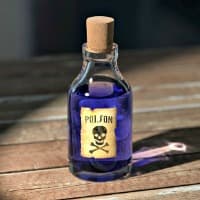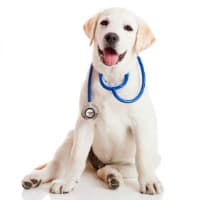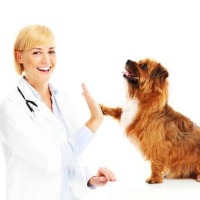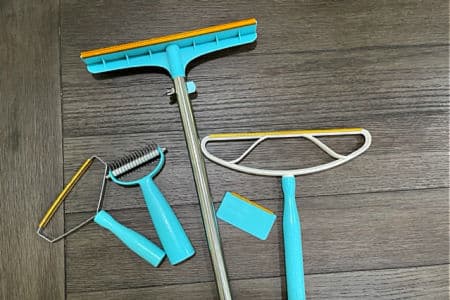FYI: If you buy something through a link on this site I may earn a commission - at NO extra cost to you.
Dog Poisoning 101
Accidental dog poisoning is more common that you might think - mostly because there are a lot of everyday foods, products and items which seem harmless but are actually toxic to dogs!
Puppies are notoriously curious, and they want to eat everything, so no matter how carefully you puppy-proof your home, or supervise your little one, there is always a risk that he'll get into something he shouldn't.
Adult dogs aren't always any more discerning, so it's important to keep an eye on them too!
You'll be surprised to find out just how many products, substances, plants, foods and other 'stuff' that we normally have in our homes can be poisonous, hazardous or even toxic to our pets!
Knowing what to do and having the right information close at hand, could make the difference between life and death for your dog.
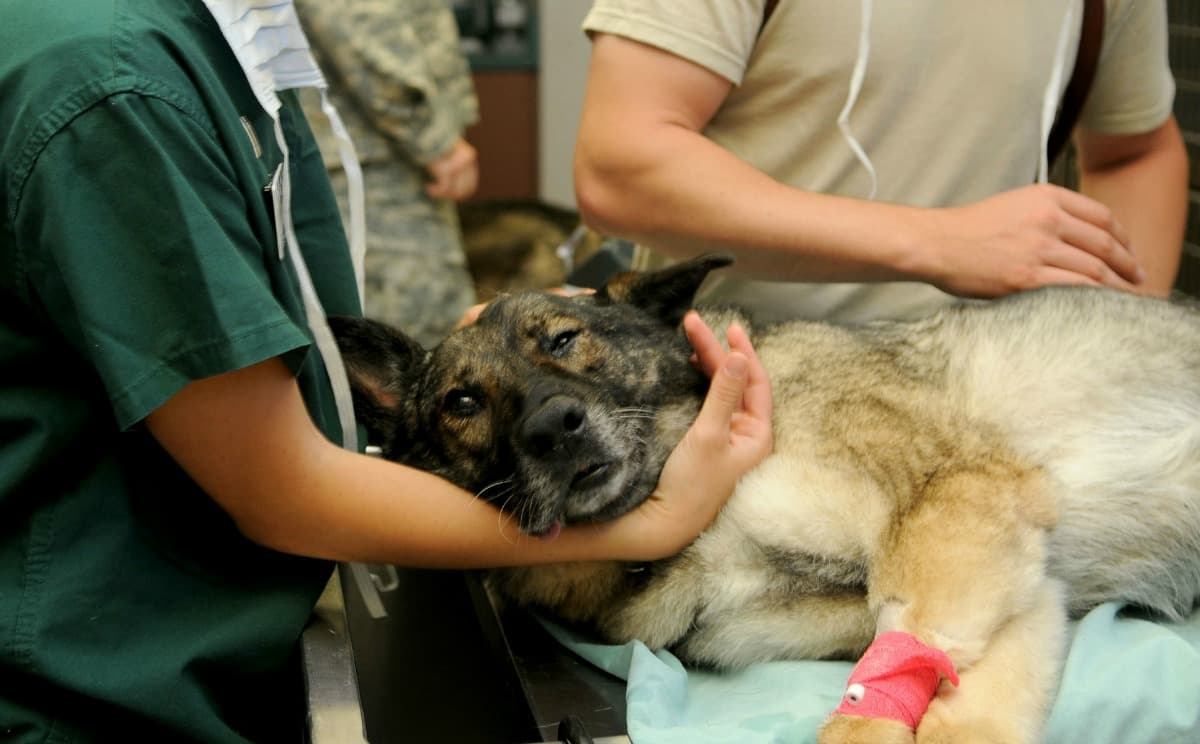
On this page I'm going to take a look at the most common culprits when it comes to dog poisoning, and what you should do if you think your puppy or dog has eaten something toxic.
According to the ASPCA thousands of dog poisoning incidents happen each year, with the most recent statistics showing the call center handles about 375 telephone calls each day - which works out to be around 137,000 calls per year!
So, let's take a look at what you need to know in order to keep your pet safe.....
Common Causes of Dog Poisoning
There are a few groups of items/products that show up over and over again in the statistics.
If you make sure to keep your pup away from these items you'll be taking a big step towards protecting him from toxins and poisons.
Here are the most common culprits:
Human Medications
Both prescription and over-the-counter products can be dangerous to your pets.
The top offenders are Ibuprofen (active ingredient in Advil & Motrin) and Acetaminophen (active ingredient in Tylenol). Dogs can be given Aspirin if it's the right type and in the right dosage, but if your pet gets more than that he's at grave risk of overdose.
Other common drugs that typically cause trouble include cold & flu medications, anti-cancer drugs, anti-depressants, diet/weight-loss drugs, and vitamins particularly iron tablets.
Household Cleaning Products
These can be very caustic and contain all sorts of harmful ingredients.
Obviously bleach is highly toxic, but dishwasher detergent and laundry detergent are poisonous as are tumble-dryer sheets, cleaning products like Mr Clean or Lysol and toilet bowl cleaners etc. etc.
Scented candles and room fragrances (such as Glade Plug-Ins) are also toxic.
Garage/Workshop Products
Lots of things you keep outdoors are poisonous for your pup.
One of the most dangerous is anti-freeze, because this has a sweet odor and taste which is attractive to dogs but just a few drops are deadly if ingested.
Other toxins that you might have tucked away in your garage, shed, basement or workshop include ice-melt, pool chemicals, rat/mouse bait or poison, mothballs, fly bait, compost fertilizers, cocoa mulch, citronella candles, plant bulbs and slug-snail bait (which contains metaldehyde).
Plants, Trees & Shrubs
Both indoor and outdoor plants, bulbs and greenery can be toxic if your pup ingests them.
The ones that tend to cause trouble most often include poinsettias, holly, mistletoe, pine tree needles, aloe-vera plants, daffodils, chyrsanthemums, clematis, azaleas, lilies, tulips, baby's breath, begonias... and more.
You can find a full list of plants that are poisonous to dogs here.... Toxic Plants
Human Foodstuffs
Many food items that are perfectly safe for humans to eat are dangerous for our pets. Some of these you probably already know, others might surprise you.
Of course chocolate is probably the number one worry (and the best-known poisonous food for dogs) and it can only take a little chocolate to cause serious problems of even death in your pup.
You can find out everything you need to know about the dangers of chocolate, how to recognize the signs that your dog is in trouble, and what to do about it on this page... Help! My Dog Ate Chocolate
But there are lots of other edible items you want to keep your pup away from. These include hard candies, chewing gum, any candy that contains the artificial sweetener Xylitol, raisins or grapes, avocados, macadamia nuts and more.
You can get more detailed information on food, medications and household products which are potentially toxic to your dog here... Stuff That's Poisonous To Dogs
What To Do In A Dog Poisoning Emergency
Knowing what steps to take if you think your pup has eaten something dangerous could save his life, because depending on what it is he's ingested every minute counts.
Don't Panic!
This one is important. Time is of the essence and you don't want to waste it because your panic-stricken brain refuses to function. Take a deep breath and then follow these steps....
Collect Evidence
Quickly pick up any bottles, containers or packaging that the poisonous substance was in.
If possible collect any of the leftover item too. This will help the Poison Control staff or your own veterinarian/emergency vet clinic determine what the possible effects of the poison may be, and how best to treat it.
Review Your Dog's Vital Statistics
Try to remember these and jot them down if your brain is a bit shaky.... your dogs breed, weight, age and any symptoms he may be showing.
Make a note of important info such as what your dog ingested, how long ago your dog ingested it, any symptoms you've noticed and so on. You'll need this information for the medical/veterinary personnel.
Call For Help
Call the ASPCA Animal Control Center at 1-888-426-4435 or 1-800-548-2423 (there may be a $65 charge for this service)or your own veterinarian or one of your city's 24 hour Emergency Animal Hospitals.
You can also call the International Animal Poison Control Center Hotline at 1-888-232-8870 which is available 24 hours a day. There is also a similar charge for this service.
It's a good idea to always have these phone numbers written or posted somewhere easy to find in an emergency. Taped inside a kitchen cupboard or on a central notice board in your home are good places. Make sure every member of your household knows where they are.
Don't 'Wait & See'!
Always seek veterinary help immediately if you know, or even suspect, your pup has ingested something toxic or potentially dangerous.
With some poisons, the effects aren't immediately obvious and symptoms may take hours (or occasionally days) to appear. By then it could be too late to prevent or reverse serious illness or even the death of your beloved pet.
If your veterinarian or medical personnel advise you to induce vomiting in your puppy you can try this solution......
Make up a 1 to 1 solution of 3% hydrogen peroxide and water to give to your dog.
Approx. 1 tbsp of this mixture per 10lbs of his body weight is about
right. Use a measuring medicine spoon (like the ones babies use) or a
turkey baster to make things a bit easier.
But remember, only do this if your veterinarian or the poison control center operator tells you to!
you might also like...
- Home
- Dog Poisoning
FTC Disclosure: Some pages on this site contain affiliate links. I may earn on qualified purchases.
